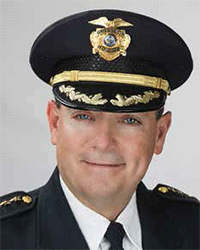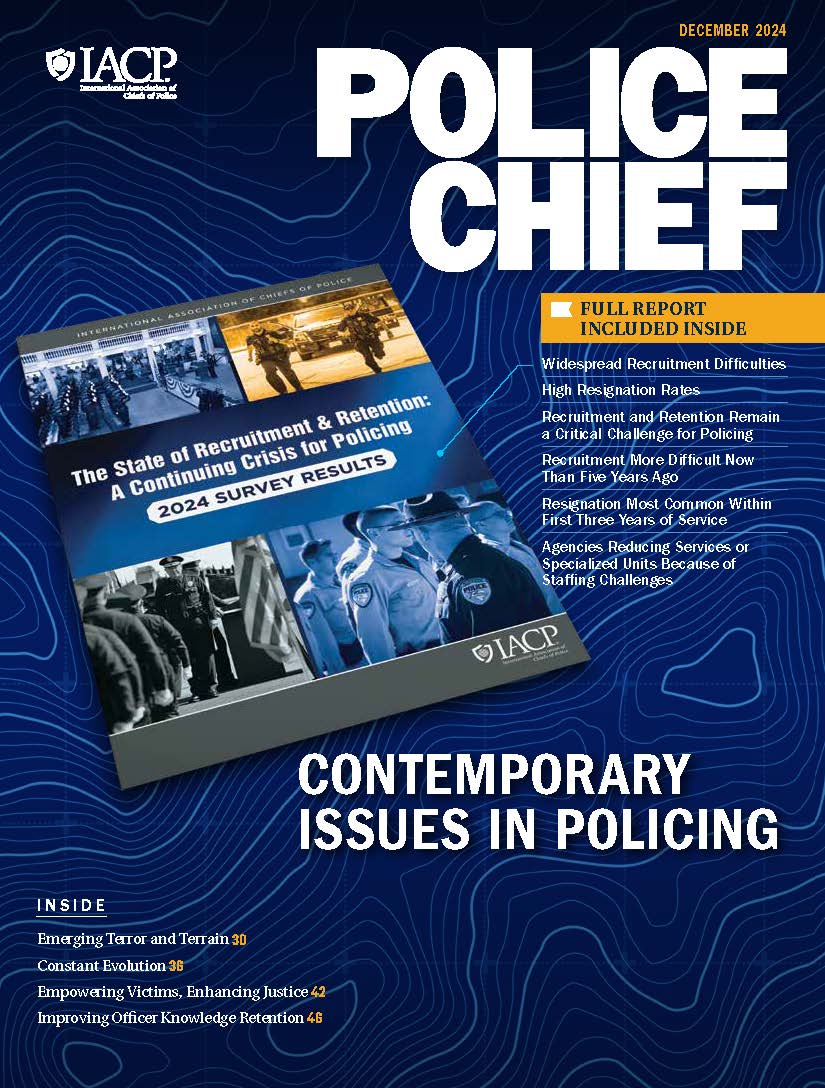 As I prepare to complete my term as president of the International Association of Chiefs of Police, I want to thank you all for your service as law enforcement professionals and your work and leadership on behalf of the association. It has truly been an honor to serve as your president for the past year.
As I prepare to complete my term as president of the International Association of Chiefs of Police, I want to thank you all for your service as law enforcement professionals and your work and leadership on behalf of the association. It has truly been an honor to serve as your president for the past year.
I am proud to say that the IACP membership is at a record high. We have more than 25,000 members, and our members are serving in 118 countries. This year, thus far, the IACP has hosted or participated in a number of international gatherings of law enforcement officials, including the IV Spanish National Police International Symposium, Palencia, Spain; the 83rd INTERPOL General Assembly, Monaco; meetings with Senior European Police leaders in Brussels, Belgium; and the inauguration of the INTERPOL Global Complex for Innovation (IGCI) and bilaterals with key National Police Directors and other international law enforcement executives.
When I was sworn in as your president in Orlando, Florida, nearly one year ago, I never imagined how difficult the year would be for law enforcement and the extent to which I would need to defend the profession during my time as president.
I have had countless media interviews with national U.S. affiliates such as Fox News, CNN, PBS, ABC, The Washington Post, The New York Times, The Wall Street Journal, the Associated Press, and others—too many to list them all. In each of those media appearances, I spent time explaining law enforcement’s actions, challenges, and concerns and the work we are doing to safeguard our communities, to further enhance our relationship with the public, and to build trust.
Based on feedback we heard from you, our members, we realized it was imperative to showcase the positive side of law enforcement and arm our members with the tools they need to speak up for the profession.
In response to this, we launched the Protect and Serve Initiative. This involved the creation of a webpage that provides officers and executives with the tools and resources they need to educate the public and build sustainable community relationships. The Protect and Serve webpage includes good stories from the field, talking points, model policies, facts and figures about law enforcement, research reports, legislative resources, communications materials, and much more. We have enjoyed showcasing positive stories about law enforcement on Protect and Serve—the shining examples of the things you do for your communities day in and day out that often go unrecognized.
The IACP also spearheaded the #WhyIWearTheBadge campaign to highlight the diversity and commitment of law enforcement professionals. Officers from all over the world are using the hashtag #WhyIWearTheBadge to share photos, videos, and stories on social media platforms. Future law enforcement leaders need to know why wearing the badge is so important. Our communities need to know that we care and take the call to serve and protect very seriously. A special thank you goes out to all who have contributed thus far. Please continue to share your stories on social media using #WhyIWearTheBadge.
In addition to the time I have spent educating the media on behalf of the IACP, I have also been actively involved in discussions with the U.S. administration, government officials, and members of the U.S. Congress.
As always, our legislative efforts on behalf of the law enforcement profession and police executives are a centerpiece of the IACP’s activities. Throughout the year, the IACP has been actively working with the U.S. administration, as well as with members of Congress, on a wide range of issues critical to public safety and the law enforcement profession. The IACP continues to be involved in policy debates over law enforcement funding, technology and privacy, encryption, criminal justice reform, community policing, forensics, highway safety, information and intelligence sharing, use of military equipment, and asset forfeiture, to name just a few.
We are constantly providing important feedback on legislation as it is being drafted to ensure it takes law enforcement considerations into account. I have also had the pleasure of being invited this year to testify before the U.S. House Homeland Security Committee on the use of unmanned aerial vehicles (UAVs) and information sharing, as well as testifying on building trust and legitimacy before President Obama’s Task Force on 21st Century Policing.
It has been our goal as an association to make sure that policy makers understand the impact their decisions have on public safety issues and on the ability of state, local, and tribal law enforcement to provide services and protection for the citizens we serve.
One of my other initiatives that I vowed to work on when I became president was the issue of cybercrime. Cybercrime is a global threat to the economic and physical security of every nation we represent. That is why we created the Law Enforcement Cyber Center—to enhance awareness, expand education, and build the capacity of justice and public safety agencies to prevent, investigate, prosecute, and respond to cybercrime. The Cyber Center contains information, resources, and training for police chiefs and executives, patrol officers, digital forensic investigators, detectives investigating crimes that involve electronic devices, and prosecutors. The Center primarily addresses cybercrime investigations, digital forensics, and information systems security, but will continue to evolve as new and emerging threats and crimes arise. If you haven’t already, I encourage you to visit IACP’s Cyber Center webpage (www.iacpcybercenter.org).
Clearly, this has been a remarkably busy and productive year for the IACP. It has been my honor and privilege to have the opportunity to lead this amazing organization for the past year. It has truly been the highlight of my career thus far. I would like to offer IACP 1st Vice President Terrence Cunningham my congratulations and complete support as he assumes the IACP presidency. I know he will do a terrific job leading our organization.
Finally, there is not enough room to thank everyone in this article who made this a special year for me and helped me along the way. I would like to express my deepest appreciation to my professional colleagues, friends, the talented staff at IACP headquarters, and the men and women of the University of Central Florida Police Department. All of you have played a vital role in allowing me to take on this tremendous challenge and experience it to the fullest. I look forward to continuing to serve the IACP in whatever capacity I can. ♦


